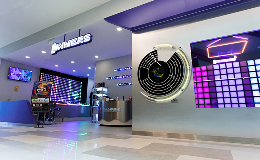
Building a strong, united team is essential to success in today’s fast-paced workplace. One powerful method to foster team cohesion and improve workplace dynamics is through interactive games, especially immersive experiences like escape rooms.
INMERS, a renowned escape room provider in Singapore, offers horror-themed rooms that feature 5D effects, realistic NPCs, and complex puzzles, providing an ideal backdrop for team-building activities. Here’s a look at how interactive games like these contribute to 10 significant benefits for team building, helping teams communicate better, solve problems together, and ultimately work as a more cohesive unit.
1. Enhanced Communication Skills
Interactive games provide a safe yet challenging environment where team members must communicate effectively to succeed. Escape rooms, in particular, require players to convey ideas, share observations, and discuss solutions. This focus on real-time communication builds confidence in expressing ideas and improves overall team interaction, essential skills that translate directly to workplace dynamics.
Research shows that employees who participate in activities promoting open dialogue report increased clarity in their roles and responsibilities, leading to higher job satisfaction. In an escape room, where time is limited and teamwork is critical, team members learn to communicate precisely and effectively, leaving less room for misunderstandings when they return to the office.
2. Boosted Problem-Solving Abilities
Escape rooms are uniquely suited to enhance problem-solving skills. With their multi-layered puzzles, they encourage teams to think critically and work collaboratively under pressure. These experiences mirror real-life workplace challenges, where finding solutions requires creativity, strategy, and group input. By facing and overcoming these hurdles, teams develop solid problem-solving strategies for daily tasks.
For instance, while working through a complex puzzle in an escape room, a team member might notice a hidden pattern that no one else sees. This moment of insight, followed by shared excitement, encourages innovative thinking, which teams often carry back to work, approaching daily challenges with fresh perspectives and enthusiasm.
3. Fostering Collaboration and Teamwork
Interactive games like escape rooms necessitate collaboration, as teams must rely on each other’s strengths to progress. Each participant plays a vital role, highlighting the importance of shared responsibility. Working through challenges reinforces collaboration and emphasises the value of each team member’s contributions, ultimately creating a more cooperative work environment.
Some members may be naturally more vocal in traditional team settings, while others are hesitant to share their thoughts. Escape rooms level the playing field; each member’s input becomes crucial, making the quieter voices feel heard and valued. This dynamic encourages a more inclusive team culture at the office, fostering a sense of belonging and trust.
4. Encouraging Creativity and Innovation
Escape rooms challenge players’ typical thinking patterns, encouraging them to think outside the box. The unexpected scenarios and diverse puzzle designs push team members to approach problems creatively, fostering a culture of innovation. When teams encounter unique, thrilling environments, they become more comfortable exploring creative solutions, which can lead to increased innovation back in the workplace.
Various studies have highlighted how team-building activities that involve problem-solving can increase creative outputs in a business setting. Escape rooms, with their imaginative themes and surprising twists, are especially effective for sparking new ideas and breaking out standard thinking routines.
5. Strengthening Trust Among Team Members
Building trust among team members is essential for an effective workplace, and interactive games provide an excellent opportunity for team members to rely on one another. The team must work through high-stress challenges together, which builds trust and reinforces the sense that each member is dependable and capable under pressure.
In an escape room scenario, participants often face moments of heightened intensity, where trust becomes the only way forward. This strengthens relationships and cultivates mutual respect—qualities that resonate well within work environments, especially during demanding projects or deadlines.
6. Increasing Adaptability and Resilience
Interactive games, especially in dynamic environments, encourage teams to adapt quickly to new information or changing conditions. Each clue or puzzle could completely alter the team’s approach in an escape room, helping them practice flexibility and resilience. Learning to adapt in real-time strengthens team members’ ability to handle unexpected challenges in the workplace with a positive, problem-solving mindset.
The fast-paced nature of escape rooms requires on-the-spot decision-making and pivots, training teams to stay calm, make swift adjustments, and embrace flexibility. These skills are particularly valuable in industries where adaptability is crucial, such as technology, marketing, and healthcare.
7. Boosting Morale and Engagement
Engaging, enjoyable activities improve team morale. Interactive games create a break from routine, allowing team members to unwind while working towards a common goal. The sense of accomplishment from completing a challenging game together can lead to higher job satisfaction and team spirit. When team members return to work, they often carry this renewed energy, increasing engagement and productivity.
Research has found that team-building activities can significantly improve employee engagement and retention rates. Escape rooms, with their intense, hands-on experience, offer a refreshing shift from typical team outings, making them a memorable morale booster.
8. Promoting Leadership Skills
Interactive games provide opportunities for natural leadership to emerge. Each game requires someone to take the lead, delegate tasks, or keep the team focused on the goal. These scenarios allow team members to practise leadership skills in a supportive environment. As individuals step into these roles, they build confidence in their abilities to lead and manage within their regular work environment.
Escape rooms offer a safe space where team members can take on leadership roles without the pressures of a typical work hierarchy. This can reveal hidden leadership potential and boost self-assurance, qualities that improve team functioning and morale.
9. Encouraging Accountability
Games that require collective participation reinforce accountability within a team. Each member’s contributions—or lack thereof—impact the team’s success, reinforcing a sense of individual responsibility. Interactive games demonstrate that the team is more likely to achieve its goals when each member is fully engaged and accountable.
Accountability becomes a natural part of the experience in an escape room setting. By seeing firsthand how their actions influence outcomes, team members gain a deeper appreciation for accountability, an essential workplace value that improves overall performance.
10. Creating Lasting Team Bonds
One of the most significant benefits of interactive games is the lasting bond they create among participants. Sharing a challenging, high-stakes experience leads to stronger connections and camaraderie that can last well beyond the game. These bonds translate into better collaboration and mutual respect in the workplace, as team members share a meaningful experience that reinforces their unity.
People sharing memorable experiences outside their regular work environment are more likely to view one another as allies. These connections foster a greater sense of empathy and understanding within the team, ultimately enhancing teamwork and harmony in the workplace.
Conclusion
Interactive games, such as escape rooms, offer a powerful team-building tool, with benefits ranging from enhanced communication to strengthened trust and adaptability. In Singapore, INMERS’s horror-themed escape rooms exemplify how immersive, high-stakes challenges can bring teams together, leaving them more cohesive, resilient, and ready to tackle workplace challenges. If you’re seeking a unique, impactful team-building experience, consider booking an escape room with INMERS to unlock these benefits for your team.
















